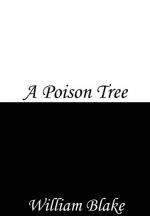|
This section contains 303 words (approx. 1 page at 400 words per page) |

|
A Poison Tree Summary & Study Guide Description
A Poison Tree Summary & Study Guide includes comprehensive information and analysis to help you understand the book. This study guide contains the following sections:
This detailed literature summary also contains Bibliography on A Poison Tree by William Blake.
A Poison Tree is one of the lesser-known of the twenty-six poems William Blake published in 1793 as Songs of Experience, which also contains The Tyger, Ah, Sun-flower, and London. Songs of Experience is the companion volume to Blake's Songs of Innocence, published in 1789. Blake printed Songs of Innocence and Songs of Experience in one volume in 1794, adding the descriptive subtitle Shewing the Two Contrary States of the Human Soul. One of the best sources of A Poison Tree is The Complete Poetry and Prose of William Blake (1982), edited by David V. Erdman and published by Doubleday.
In the poems of Songs of Innocence and Songs of Experience, Blake contrasts how the human spirit blossoms when allowed its own free movement, which he calls a state of innocence, and how it turns in on itself after it has been suppressed and forced to conform to rules, systems, and doctrines, which he calls a state of experience. The two states recall one of the principal events in the Judeo-Christian story, the fall from innocence caused by Adam and Eve when they eat fruit from the forbidden Tree of the Knowledge of Good and Evil in the Garden of Eden. The poison tree of Blake's poem suggests that biblical tree.
Although it can be read by itself, A Poison Tree benefits significantly from being read as a further expression of the poems immediately preceding it in Songs of Experience, especially The Garden of Love and The Human Abstract. In the three poems, Blake criticizes the imposition of religious and social morality on the human sensibility, suggesting that it stifles the goodness and love inherent in a spirit not fettered by such rules. In Blake's Notebook, the original title of A Poison Tree is Christian Forbearance, which the poem criticizes as the cause of hypocrisy.
Read more from the Study Guide
|
This section contains 303 words (approx. 1 page at 400 words per page) |

|



